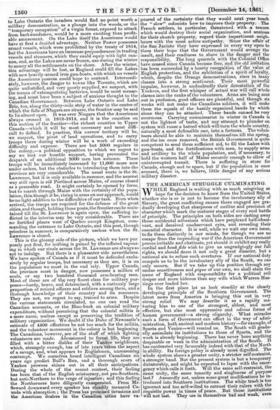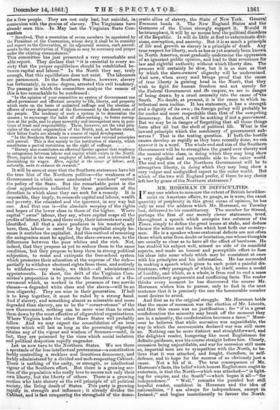THE AMERICAN STRUGGLE CULMINATING.
WHILE England is waiting with as much misgiving as hope for the decision to know from the United States, whether she is or is not to become the involuntary ally of Slavery, the great conflicting causes there engaged are gra- dually developing that sharpness of outline and precision of character which mark the maturer stages of every real battle of principle. The principles on both sides are casting away those accidental adhesions which have perplexed half-obser- vant, and deceived unobservant eyes, and revealing their essential character. It is well, while we wait our own issue, to fix them distinctly in our minds, for though we see no escape from the impending war if the American Government proves irritable and obstinate, yet should it exhibit any really cordial and bonci fide wish to give us ungrudgingly our full rights, we should deem it not only a great disaster, but a national sin to refuse such overtures. If our national duty compels us to be the involuntary ally of the South, we can only mourn. But if we take up this position through any undue sensitiveness and pique of our own, we shall stain the name of England with responsibility for a political evil deeper and more hideous than any with which Warren Has- tings ever loaded her. In the first place let us look steadily at the clearly developing principle of the Southern Government. The latest news from America is bringing this out in very strong relief. We may describe it as a rapidly ma- turing bias to one of the strongest, ablest, and most effective, but also most oppressive and odious forms of human government—a strong oligarchy. What miracles such a form of Goverment can effect in the way of admi- mistration, both ancient and modern history—for example, of Sparta and Venice—will remind us. The South will gradu- ally assimilate its institutions to those of Sparta, and the work is already beginning. There has never been anything despicable or weak in the administration of the South. It has contrasted very favourably indeed with that of the North in ability. Its foreign policy is already more dignified. The whole system shows a greater unity, a stricter self-restraint, a stronger hand. But the present system is but a temporary dictatorship, and might be expected to lapse with the emer- gency which calls it forth. Will the same self-restraint, the same unity, the same tenacity and singleness of purpose last ? Assuredly not, unless some great modifications be in- troduced into Southern institutions. The white trash is too ignorant and too self-willed to entrust their rulers with the requisite power in times of peace. But those institutions will not last. They 'ire in themselves bad and weak, even for a free people. They are not only bad, but suicidal, in connexion with the genius of slavery. The Virginians have already seen this. In May last the Virginian State Con- vention " Resolved, That a committee of seven members he appointed by the President of the Convention, whose duty it shall be to consider and report to the Convention, at its adjourned session, such amend- ments to the constitution of Virginia as may be necessary and proper under the existing circumstances." This committee has just presented a very remarkable and able report. They declare that "it is essential to every so- ciety that the proper equilibrium should be established be- tween capital and labour." In the North they say, truly enough, that this equilibrium does not exist. The labourers are paramount. In the Southern States, however, slavery has fortunately, in some degree, arrested this evil tendency. The passage in which the committee analyze the reason of this is too remarkable to be condensed : "In the opinion of your committee no system of Government can afford permanent and effectual security to life, liberty, and property which rests on the basis of unlimited suffrage and the election of officers of every department of the Government by the direct vote of the people. The tendency of such a system is to demoralize the masses ; to encourage the habit of office-seeking; to foster corrup- tion at the polls, and to place unworthy and incompetent men in posi- tions of trust and responsibility. These, however, are the vital prin- ciples of the social organization of the North, and, as before stated, their bitter fruits are already in a course of rapid development. "In the Southern States more conservative and rational principles still prevail. This is due mainly to the institution of slavery, which constitutes a partial restriction on the right of suffrage. . . . "Slavery also constitutes an effectual barrier against that tendency to antagonism between labour and capital which exists in the North. There, capital is the casual employer of labour, and is interested in diminishing its wages. Here, capital is the owner of labour, and, naturally, seeks to enhance its rewards."
It will be seen at once that the Southern statesmen have hit the true blot of the Northern politics—the weakness of a Government in which mere uneducated " numbers" control the policy of the State. But the remarkable point is the clear apprehension indicated by these gentlemen of the direction in which alone they can seek for a remedy. It is impossible, they imply, to reconcile capital and labour, wealth and poverty, the educated and the ignorant, in any way but one. And that one is—the absolute merging of the rights and hopes of the lower class in those of the higher. Where capital " owns" labour, they say, where capital reaps all the profits of labour, there, and there only, their interests are really identified. All that a slave produces is his master's, and here, then, labour is cared for by, the capitalist simply be- cause it enriches the capitalist. And this method of removing the antagonism must be applied, the slave-owners see, to the differences between the poor whites and the rich. Not, indeed, that they propose ad yet to reduce them to the same condition, but they propose to keep them in strong political subjection, to resist and extirpate the free-school system which promotes their education at the expense of the rich— partially to withdraw electoral rights from them, and entirely to withdraw—very wisely, we think—all administrative appointments. In short, the drift of the Virginian Com- mittee's proposition is to promote the formiition of a Go- vernment which, as worked in the presence of two servile classes—a degraded white class and the slaves—will be an iron oligarchy. They are wise in their generation. If hell is to keep together, it must be ruled by a strong hand. And if slavery, and something almost as miserable and more degraded than slavery, are to be the " corner-stones" of the new Government, nothing can be more wise than to crush them down by the moat effective of oligarchical organizations. Where Virginia leads the other Slave States will probably follow. And we may expect the consolidation of an iron system which will last as long as the governing oligarchy retains any of the vigour and wisdom of freemen—until, in fact, they are poisoned by the vices which social isolation and political despotism rapidly engender. Let us now turn to the Northern States. We see there a spectacle of far less intellectual pretensions—a constitution feebly controlling a reckless and licentious democracy, and feebly administered by a divided and mob-respecting Cabinet. There is nothing of the unity, or strength, or intellectual vigour of the Southern effort. But there is a growing sec- tion of the population who really love to secure not only their own liberty, but the liberty of others. There is a growing section who hate slavery as the evil principle of all political society, the living death of States. This party is growing rapidly in. strength and influence ; it already divides the Cabinet, and is fast conquering the stronghold-of the demo- cratic allies of slavery, the State of New York. General Fremont heads it. The New England States and the Germans of the Union strongly support it. Should it be triumphant, it will by no means heal the political disorders of the Republic. It will do little at first to exterminate divi- sions, corruption, and anarchy. But it is as much a principle of life and growth as slavery is a principle of death. Any true respect for liberty, such as has as yet scarcely been known in North America, must gradually undermine the oppression of an ignorant public opinion, and lead to that reverence for law and rightful authority without which liberty dies. The process will certainly be slow, but it is as sure as that by which the slave-owners' oligarchy will be undermined. And now, when every mail brings proof that the cause of true liberty is gaining head in the North, that they wish to fight for human freedom and not merely for the Federal Government and its empire, we are iu danger of being drawn by a cruel necessity into the cause of the South. No doubt, at present, it is the cause to which in- tellectual men incline. It has statesmen, it has a strength and a dignity of its own ; its foreign policy will probably be far cooler and more respectable than that of the competing democracy. In short, it will be nothing if not a government. But we may be in danger of forgetting that all these things form after all but the shell of political life. What is the inward principle which the machinery of government sub- serves ? That is the testing question. If both the hostile causes develop as rapidly as they have recently done, we can answer it in a word. The whole end and aim of the Southern Government will be to strengthen the guard over slavery and the menial white class, in doing which they may long show a very dignified and respectable side to the outer world. The end and aim of the Northern Government will be to strengthen liberty, in doing which they may long show a very vulgar and undignified aspect to the outer world. But which of the two will England prefer, if there be any choicp left her by grace of the Northern statesmen ?































 Previous page
Previous page